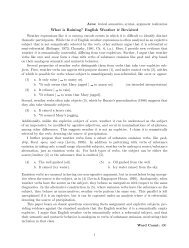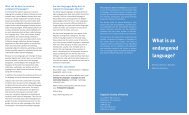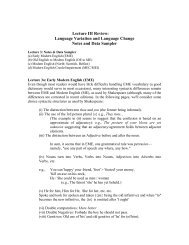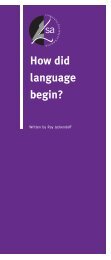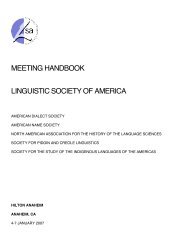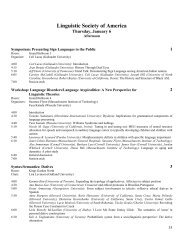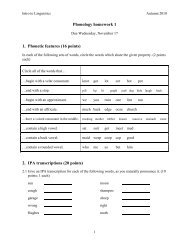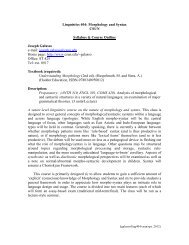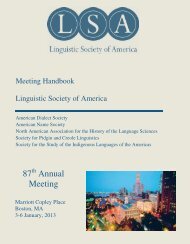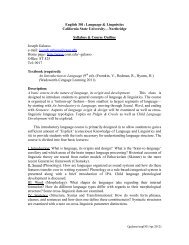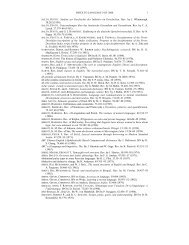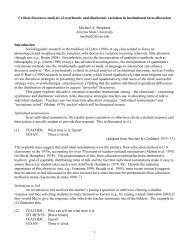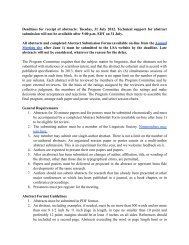Saturday, 5 JanuaryPanelevidence-based model for increasing racial and ethnic diversity among linguistics researchers. All presentations highlight thejournal’s natural overlap with interests <strong>of</strong> both the LSA and the MLA. Presenters also represent different types <strong>of</strong> universitieswith diverse regional, ethnic, cultural, religious, and linguistic perspectives. Anne Charity Hudley and Kazuko Hiramatsu,associate editors <strong>of</strong> Language with responsibilities for the Language: Teaching <strong>Linguistic</strong>s articles will serve as the paneldiscussants, t<strong>here</strong>by allowing panelists and the audience to participate in the creation <strong>of</strong> questions and themes for future issues.After the presentations, a discussion session will allow audience members to discuss ideas with individual panelists in addition totwo other research groups who will present posters on their work infusing linguistics into postsecondary general education andhigh school curricula.AbstractsWilliam G. Eggington (Brigham Young University)Toward the Development <strong>of</strong> an Epistemology <strong>of</strong> <strong>Linguistic</strong>s for Pedagogical PurposesThis presentation begins by assuming that linguistic ways <strong>of</strong> knowing, analyzing and sharing lead to similar, but unique, positiveoutcomes. Students trained in linguistic epistemologies, or ways <strong>of</strong> knowing and thinking develop valuable abilities that greatlyenhance essential life-skills and opportunities for career, personal and interpersonal success. I will review the research related tothe development <strong>of</strong> science and mathematics epistemologies for pedagogical purposes in an effort to develop a model that couldbe applied to linguistic epistemologies. This will be followed by a critique <strong>of</strong> the previous, decidedly sparse, work conducted indeveloping an epistemology <strong>of</strong> linguistics for pedagogical purposes. I will compare and contrast this work with the proposedmodel and conclude by suggesting a developmental agenda for linguistic pedagogical practice based upon not only what we wantour students to know about language, but also how we would like them to think about how language functions.David Bowie (University <strong>of</strong> Alaska Anchorage)The effect <strong>of</strong> linguistics instruction on undergraduates’ linguistic attitudesThis study investigates the linguistic attitudes <strong>of</strong> students in three different types <strong>of</strong> undergraduate linguistics courses: anintroductory survey <strong>of</strong> the discipline, an introductory course in syntax and usage directed toward aspiring secondary Englishteachers, and an upper-division course in the history <strong>of</strong> the English language. Students were surveyed on their attitudes aboutlanguage at the beginning and end <strong>of</strong> each course. By the end <strong>of</strong> all <strong>of</strong> the courses, students’ attitudes overall had shiftedsignificantly on only a few measures, but the shifts that occurred involved moves in the direction toward those generally assumedby linguists. Linguists generally make a number <strong>of</strong> assumptions about language and its use that are not widely held by nonlinguists.The results for each course, however, suggest that the best way to transmit attitudes toward language as held by linguistsis to model them, rather than either ignoring them or explicitly discussing them.Gaillynn Clements (Cambridge University/University <strong>of</strong> North Carolina)Teaching linguistics in a general education literature courseHow do we introduce linguistics to students who are business, science, and English majors? As linguists, we know how usefullanguage study is to a variety to majors and interactions in life. But this knowledge seems to be a closely guarded secret. We caneffectively reach many students by integrating linguistics into the general educational or core requirements. At High PointUniversity and University <strong>of</strong> North Carolina-School <strong>of</strong> the Arts, I have incorporated language study into composition (to a lesserextent) and literature classes allowing the students to systematically study how others speak and write as well as how they speakand write. Perform close readings using linguistic devices opens up texts and engages the students in critical readings and newdiscoveries <strong>of</strong> a text’s characters and authors, and, at times, themselves or the world. The integration <strong>of</strong> literature and linguisticsinto a single course brings linguistics to a large audience and shows psychology, sociology, anthropology, English, education, andeven business majors that t<strong>here</strong> is academic, social, and economic value in studying linguistics.Anne H. Charity Hudley (College <strong>of</strong> William & Mary)Attracting underrepresented students to research in linguisticsI present methods and programs that have been successful in attracting underrepresented students to research in linguistics usingevidence based methods <strong>of</strong> broadening participation in linguistics as established by the National Science Foundation and otherorganizations that sponsor programs to support research by those from underrepresented groups. Initiatives include establishingmentoring early on for both undergraduate and graduate students who are interested in linguistics, particularly in programs w<strong>here</strong>such student may be experiencing solo status within their class, cohort, or program.104
PanelSaturday, 5 JanuaryI outline the benefits <strong>of</strong> the coordination <strong>of</strong> research questions with disciplines, including education and the speech and hearingsciences, which have established pathways for recruiting underrepresented students so that research pipelines and cohortrelationships can be forged across disciplines and universities. Finally, I discuss the merits, for both students and faculty, <strong>of</strong>aligning with research organizations, such as the Ford Foundation, that support underrepresented students and their mentors.Poster/roundtable Abstracts:Kristin Denham (Western Washington University)Anne Lobeck (Western Washington University)The changing focus <strong>of</strong> teaching and doing linguisticsWith linguistics becoming ever more interdisciplinary, linguists <strong>of</strong>ten find themselves in departments (Composition, English,Languages) with colleagues and students unfamiliar with the field. We invite participants to explore the benefits, goals andchallenges <strong>of</strong> teaching linguistics to non-majors, and how (and whether) these differ from those for teaching <strong>Linguistic</strong>s majors.How does teaching non-majors enrich our own scholarship, teaching, and service? In our case, we have developed a linguisticscurriculum for English majors, including a minor in English Language and <strong>Linguistic</strong>s. Our courses form part <strong>of</strong> the university’sinterdisciplinary <strong>Linguistic</strong>s Program curriculum, and we have both <strong>Linguistic</strong>s majors and English majors in our classes. Thisexperience has led us to become deeply involved in linguistics and K-12 education, a field that enriches the pr<strong>of</strong>ession andbridges the gap between majors and non-majors, changing in significant and valuable ways what it means to “do” linguistics.Adam Hesterberg (Princeton University)Lori Levin (Carnegie Mellon University)Patrick Littell (University <strong>of</strong> British Columbia)James Pustejovsky (Brandeis University)Dragomir Radev (University <strong>of</strong> Michigan)The North <strong>America</strong>n Computational <strong>Linguistic</strong>s OlympiadThe North <strong>America</strong>n Computational <strong>Linguistic</strong>s Olympiad (NACLO, is a contest for high school students in which they learnabout linguistics, languages, and computation by solving puzzles. The contest requires no prior knowledge. Each puzzle is selfcontainedand leads the student to a discovery about some aspect <strong>of</strong> the language in question (phonology, morphosyntax,historical change, etc.) or a computational technique used for language technologies. The purpose <strong>of</strong> NACLO is to introducestudents to linguistics, languages, and computation before college t<strong>here</strong>by increasing the number <strong>of</strong> students who study linguisticsand language technologies in college. NACLO was awarded the LSA <strong>Linguistic</strong>s, Language, and the Public award in 2011.Through this poster introduction, we hope to increase the number <strong>of</strong> universities that host NACLO and the number <strong>of</strong> linguistswho participate in the program committee and other NACLO activities.Michal Temkin Martínez (Boise State University)Tory Deltoro (Boise State University)Andrew Hayes (Boise State University)Kelli Jones (Boise State University)Jessica Milanez (Boise State University)Ivana Müllner (Boise State University)Dustin Svoboda Boise State University)Danielle Yarbrough (Boise State University)Technology in the linguistics classroom: instructor and student perspectivesThis poster will highlight best practices for incorporating technology into the linguistics classroom. From facilitating real-timefeedback in large lecture-style introductory classes to the use <strong>of</strong> mobile technology and document sharing in field methodscourses, this presentation will highlight the benefits and downfalls <strong>of</strong> the incorporation <strong>of</strong> technology into undergraduate courses.It will also demonstrate the importance <strong>of</strong> using technology as a tool to better meet and assess learning objectives. Both instructorand student perspectives will be outlined and discussed.105
- Page 1 and 2:
Meeting HandbookLinguistic Society
- Page 3 and 4:
Meeting HandbookLinguistic Society
- Page 7 and 8:
Exhibit Hall Floor PlanGrand Ballro
- Page 9 and 10:
LSA LEADERSHIP CIRCLE 2012The LSA w
- Page 11 and 12:
JOINT SESSIONSMLA Forum Session:Tun
- Page 13 and 14:
Endangered Language FundOpen Annual
- Page 15 and 16:
Linguistic Service Award: Prior to
- Page 17 and 18:
Foundations of Historical Linguisti
- Page 19 and 20:
Sister Societies at a GlanceThursda
- Page 21 and 22:
Sister Societies at a GlanceFriday,
- Page 23 and 24:
Sister Societies at a GlanceSaturda
- Page 25 and 26:
Sister Societies at a GlanceSunday,
- Page 27:
NewtitlesinLinguisticsfrom Equinox
- Page 30 and 31:
Iran rejects the idea that sanction
- Page 32:
Thursday AfternoonLSAVerb Phrase Sy
- Page 37 and 38:
LSAFriday MorningLaura Staum Casasa
- Page 39 and 40:
LSAFriday AfternoonVowels and Varia
- Page 41 and 42:
LSAFriday EveningInvited Plenary Pa
- Page 43 and 44:
LSAFriday EveningSECRETARY-TREASURE
- Page 45 and 46:
LSAFriday EveningProgram Committee
- Page 47 and 48:
LSAFriday EveningChanges.Language A
- Page 49 and 50:
LSASaturday MorningSaturday, 5 Janu
- Page 51 and 52:
LSASaturday MorningAnamaria Buzatu,
- Page 53 and 54:
LSASaturday MorningTom Juzek (Unive
- Page 55 and 56: LSASaturday AfternoonGrammaticaliza
- Page 57 and 58: LSASunday MorningCarrie Dyck (Memor
- Page 59 and 60: LSASunday Morning10:30 E. Allyn Smi
- Page 61 and 62: ADSFriday MorningADS Session 3 54Ro
- Page 63 and 64: ANSThursday AfternoonAmerican Name
- Page 65 and 66: ANSFriday EveningANS BanquetVenue:
- Page 67 and 68: NAAHoLSFriday MorningNorth American
- Page 69 and 70: NAAHoLSSaturday AfternoonSaturday,
- Page 71 and 72: SPCLFriday AfternoonFriday, 4 Janua
- Page 73 and 74: SSILAThursday AfternoonSociety for
- Page 75 and 76: SSILAFriday AfternoonSiouan 95Room:
- Page 77 and 78: SSILASaturday Afternoon3:00 Ellen C
- Page 79 and 80: The MIT Press“This is a remarkabl
- Page 81: Abstracts of LSA Plenary Addresses
- Page 84 and 85: Plenary AddressGrand Ballroom Salon
- Page 86 and 87: Presidential AddressGrand Ballroom
- Page 88 and 89: A forum for the full range of schol
- Page 90 and 91: Thursday, 3 JanuarySymposiumAbstrac
- Page 92 and 93: Thursday, 3 JanuarySymposiumAwarene
- Page 94 and 95: Thursday, 3 JanuarySymposiumAnna Ba
- Page 96 and 97: Friday, 4 JanuaryWorkshoppapers, wr
- Page 98 and 99: Friday, 4 JanuarySymposiumsystems,
- Page 100 and 101: Friday, 4 JanuaryForumAbstracts:Eul
- Page 102 and 103: Friday, 4 JanuaryTutorialAugmentati
- Page 104 and 105: Friday, 4 JanuaryTutorialCarol Tenn
- Page 108 and 109: Saturday, 5 JanuarySymposiumLinguis
- Page 110 and 111: Saturday, 5 JanuarySymposiumMarilyn
- Page 112 and 113: Saturday, 5 JanuarySymposiumAbstrac
- Page 114 and 115: Sunday, 6 JanuaryWorkshopMethodolog
- Page 116 and 117: Sunday, 6 JanuaryWorkshopJeff Good
- Page 118 and 119: Sunday, 6 JanuaryWorkshoppoor, unde
- Page 120: Sunday, 6 JanuarySymposiumRTs, ther
- Page 123 and 124: Abstracts of Regular Sessions
- Page 125 and 126: Ernest Lawrence Abel (Wayne State U
- Page 127 and 128: 3 rd person series developed from a
- Page 129 and 130: years do not produce compound stres
- Page 131 and 132: esults, based on the notion of Tona
- Page 133 and 134: Iris Berent (Northeastern Universit
- Page 135 and 136: David Boe (Northern Michigan Univer
- Page 137 and 138: Thomas Brochhagen (Heinrich Heine U
- Page 139 and 140: Shira Calamaro (Yale University) Se
- Page 141 and 142: Phillip M. Carter (Florida Internat
- Page 143 and 144: choices. Human Subjects Protection
- Page 145 and 146: Andries W. Coetzee (University of M
- Page 147 and 148: Emiliana Cruz (University of Massac
- Page 149 and 150: challenges, I describe a continuum
- Page 151 and 152: Stanley Dubinsky (University of Sou
- Page 153 and 154: Cleveland Kent Evans (Bellevue Univ
- Page 155 and 156: John Foreman (University of Texas a
- Page 157 and 158:
Keffyalew Gebregziabher (University
- Page 159 and 160:
argue that these speakers use this
- Page 161 and 162:
Jason D. Haugen (Oberlin College) S
- Page 163 and 164:
Bradley Hoot (DePaul University) Se
- Page 165 and 166:
Sunwoo Jeong (Seoul National Univer
- Page 167 and 168:
(conventional normalisations, norma
- Page 169 and 170:
endangered language of Sudan, and s
- Page 171 and 172:
Jurgen Klausenburger (University of
- Page 173 and 174:
Within the framework of Distributed
- Page 175 and 176:
line. We propose the memory recency
- Page 177 and 178:
Jackson Lee (University of Chicago)
- Page 179 and 180:
sonority influence the roundness of
- Page 181 and 182:
John J. Lowe (University of Oxford)
- Page 183 and 184:
Paul Marty (Massachusetts Institute
- Page 185 and 186:
Dan Michel (University of Californi
- Page 187 and 188:
Letitia Naigles (University of Conn
- Page 189 and 190:
synonyms. The older children (12;0-
- Page 191 and 192:
Paul Olejarczuk (University of Oreg
- Page 193 and 194:
Sarah Ouwayda (University of Southe
- Page 195 and 196:
Jaime Pena (University of Oregon) S
- Page 197 and 198:
Joshua Pongan (Temple University) S
- Page 199 and 200:
years studying English did not affe
- Page 201 and 202:
In 1895, J.M.R. Le Jeune published
- Page 203 and 204:
This poster reexamines the traditio
- Page 205 and 206:
Nathan A Severance (Dartmouth Colle
- Page 207 and 208:
thus furthers our understanding of
- Page 209 and 210:
Martina Anissa Strommer (University
- Page 211 and 212:
Meredith Tamminga (University of Pe
- Page 213 and 214:
Erich Fox Tree (Hamilton College) S
- Page 215 and 216:
Rosa Vallejos (University of New Me
- Page 217 and 218:
Mary Byram Washburn (University of
- Page 219 and 220:
Peter Wilson (Nepean High School, O
- Page 221 and 222:
evidence that Semitic languages ten
- Page 223 and 224:
de Vries, Mark ....................
- Page 225 and 226:
Ng, E-Ching .......................
- Page 227 and 228:
Leaders in Language and Linguistics
- Page 229 and 230:
Leaders in Language and Linguistics
- Page 231 and 232:
LSA MEMBERS HAVE MORE FUN.THAN MEMB
- Page 235 and 236:
NamesA Journal ofOnomasticsView 3 y
- Page 237:
LINGUISTIC SOCIETY OF AMERICA MEETI



